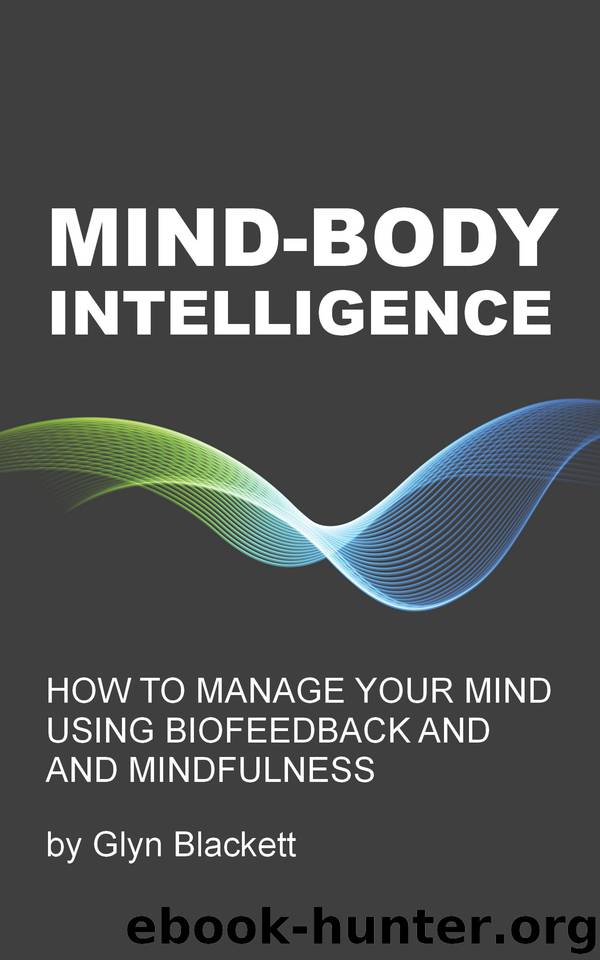Mind-Body Intelligence: How to manage your mind using biofeedback and mindfulness by Blackett Glyn

Author:Blackett, Glyn
Language: eng
Format: epub
Published: 2014-10-13T16:00:00+00:00
I find the latter aspect is not often emphasised in western expositions of mindfulness (i.e. in the MBT tradition). Mindfulness is discerning. Let's consider a couple of examples: suppose you're practising meditation and you notice some rather pleasurable sensations of strong relaxation in the belly. You find this peeks your interest, and you can “go with it”, not grasping after it but savouring it, while it lasts. Suppose some time later, thoughts related to sexual desire arise, perhaps out of a sense of boredom. Though such thoughts are alluring, you decide not to “go with it”, since your sampajanna tells you going there is not consistent with your purpose of developing calm contentment etc. So in this sense mindfulness is “lightly” judgemental: you decide to either subtly embrace or gently turn away from particular experiences depending on how they will affect you.
Mindfulness is not judgemental in the “heavier” sense of judging sexual thoughts as bad, unworthy etc., still less judging yourself as bad and unworthy for having such thoughts, or as morally culpable and deserving of punishment. Equally mindfulness isn't about judging yourself as good and worthy for not having such thoughts or for keeping focused on the breath.
As intensely social creatures we humans naturally seek the approval of our fellow humans, and we want to avoid their disapproval. We've learned to internalise this process by imagining what others would think, even about our innermost thoughts and feelings if they were made public, and thus we approve or disapprove our own inner contents. It's judgement in this sense that is no part of mindfulness.
Mindfulness involves the recognition that we have little control over what happens to appear in the mind, but we do have some control about feeding such contents with the energy of our attention.
Again we need this paradoxical mindset: you recognise “negative” (or “unskilful” as Buddhists say) qualities when they arise, but you accept them without resistance or struggle. You're looking for clarity, contentment, etc. without grasping, without trying to achieve any particular end-point.
Download
This site does not store any files on its server. We only index and link to content provided by other sites. Please contact the content providers to delete copyright contents if any and email us, we'll remove relevant links or contents immediately.
Happiness by Matthieu Ricard(3039)
How to Stop Worrying and Start Living by Dale Carnegie(2704)
Getting Things Done by David Allen(2689)
The Chimp Paradox by Peters Dr Steve(2369)
What I Need by J. Daniels(2075)
The Empath's Survival Guide by Judith Orloff(2054)
The Finnish Way by Katja Pantzar(1986)
The Smartest Kids in the World by Amanda Ripley(1843)
Jealousy by Osho(1747)
Everything in Its Place by Dan Charnas(1733)
The Joy of Hygge by Jonny Jackson(1721)
Free Yourself from Fears by Joseph O'Connor(1634)
Who Moved My Cheese?: An Amazing Way to Deal With Change in Your Work and in Your Life by Johnson Spencer(1628)
Don't Sweat the Small Stuff at Work by Richard Carlson(1556)
Think Happy to Stay Happy by Becca Anderson(1506)
How to Build Self-Discipline to Exercise by Martin Meadows(1505)
Coping with Anxiety by Edmund Bourne & Lorna Garano(1499)
The Secret History of Freemasonry by Paul Naudon(1483)
Expectation by Anna Hope(1458)
